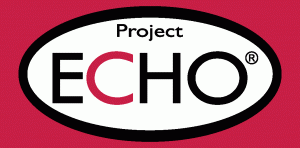The Collaborative Mentorship Network for Chronic Pain and Addiction (CMN) and the Calgary Pain Program are collaborating on an exciting new project, “Chronic Pain Gains in Alberta: An ECHO Series”. This program is free and open to all Alberta-based health care providers.
What is ECHO®?
ECHO® is an interactive online medical education program that features real cases submitted by YOU! Attendees can work through these complex cases, receive coaching, and get feedback from an expert interdisciplinary team and their fellow colleagues.
ECHO 101 – CMN Member Perspectives
CMN member Dr. Lana Fehr (LF) and mentor Dr. Lori Montgomery (LM), who have been attending the “Indigenous Chronic Pain & Substance Use” ECHO series, have provided their thoughts on the ECHO® experience below.
What makes the ECHO® model different from a regular learning session?
LF: Didactic teaching is done in smaller amounts, with the majority of time focused on case based/interactive learning. A participant presents a case and then their colleagues ask clarifying questions before investigation and management are discussed as a group. The learning is great and then recommendations can be taken back by the case presenter to use with their patient. It also happens longitudinally which gives lots of time for reflection and incorporation of learning.
LM: This is a really interactive model that encourages participants to learn from each other as well as the faculty. It can be much more in-depth because the same/similar group is attending each time. It’s specifically focused on cases that the participants are struggling with as opposed to hypothetical cases. Participants who share cases leave with a consult that was prepared by the group.
What was the best thing about ECHO®?
LF: It is much more interactive and engaging than traditional CME.
LM: I’ve enjoyed the opportunity to really dig into the complexities of pain and substance use in Indigenous communities, and benefit from a broad interprofessional group.
Who do you think can benefit from the ECHO® model?
LF: Anyone who is interested in more intensive and interactive training. It’s great if you want to do more than get a surface overview of a topic, but you really want to make a practice change and incorporate learning. It is a great way to improve knowledge but is also significantly improving my expertise and comfort with the subject matter.
LM: I can see that the participants in our session vary from brand new grads to experienced providers, and come from every possible discipline. Because it’s so tailored to the participants’ needs, it can work for anyone. However, it is a big time commitment so you need to be motivated to invest the time.
What’s the most interesting thing you’ve learned so far through the ECHO® model?
LF: I have learned a lot about the medicine wheel and how to incorporate traditional Indigenous ways of knowing into my clinical practice.
LM: This ECHO is focused on Indigenous health, and we’ve talked a lot about how to incorporate the medicine wheel in your approach to care.
Any other comments about your experience with the ECHO® model?
LF: It is a big time commitment, but worth it for the value it brings.
LM: I would encourage anyone who sees a gap in their practice (in this case in the area of pain) to participate. It’s going to significantly change the way I practice.
Get Involved. Get Registered!
With topics ranging from migraines to OUD and chronic pain, the CMN is greatly anticipating the launch of our ECHO® sessions.
When: April 6 & 20, May 4 & 18, and June 1 & 15, all at 4:30 – 5:45 PM MT
Where: Zoom
Why: It’s flexible – You can attend as many or as few sessions as you like, whatever works best! It’s free – This series is completely free of charge to registrants. It’s accessible – This series is provided virtually via Zoom so that anyone, anywhere can attend.
Get registered and consider submitting a case!
Learn more about these sessions by visiting www.cmnalberta.com/ECHO or emailing mentorship@acfp.ca.


2 Responses
I was unable to attend the St Joseph’s ECHO on Indigenous Chronic Pain and Substance Use. Will it be offered again? Or could ACFP offer something similar? I’d be willing to help. Am not at the level of being a mentor, but would love to participate in case discussions. I know of excellent psychologist (now working at AB Indigenous Virtual Care Clinic – AIVCC) who could talk about his approach with Indigenous patients – special interest in DBT, CBT and schema therapy for complex PTSD, extensive experience in N AB.
Hi Sonya,
I believe you are still able to register for the St. Joseph’s ECHO on Indigenous Chronic Pain here: https://sjcgecho.squarespace.com/indigenous-chronic-pain-substance-use. They have two more sessions on March 8 and March 15. The ACFP was not involved in the development of this program, so I am not sure if they will be running it again in the future – I believe you can contact them at sjcgecho@tbh.net for more information.
As of now the ACFP’s Collaborative Mentorship Network for Chronic Pain and Addiction (CMN) is offering the “Chronic Pain Gains in Alberta” ECHO Series. If you are interested in that series, please visit http://www.cmnalberta.com/ECHO for more information and email mentorship@acfp.ca if you would like to participate.